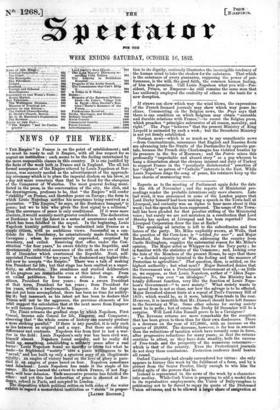NEWS OF THE WEEK:
• Tile Empire" in France is on the point of establishment ; and we must be ready to call it Empire, with all due respect for so august an institution : such seems to be the feeling entertained by the more responsible classes in this country. It is one justified by' the facts of the week both in France and in England. The all liut formal acceptance of the Empire uttered by Louis Napoleon at Bor.; deaux, was scarcely needed as the advertmenient of the approach- ing cerethony-which is to place the imperial diadem on his brow, at a day not more uncertain than that to be fixed for the obsequies: of the Conqueror of Waterloo. The most general feeling mani- fested in the press, in the conversation of the city, the club, and the drawingroom, professes to be, that "the Empire" will confer' "stability" on France, and therefore peice o'n Europe ; the form in which Louis Napoleon notifies his acceptance being received as 6: guarantee. "The Empire," he says, at the Bordeaux banquet," is peace; but wo to him who gives the first signal to a collision.* Thus the assurance of peace is only conditional. If it were more absolute, it would scaroely merit greater confidence. The declaration at Bordeaux is but the latest in a series of assurances each one of which has been falsified in the sequel. In the beginning, Louis Napoleon humbly petitioned to be readmitted into France as a simple citizen, with no ambitious views. Successful as a can- didate for the Presidency, he ostentatiously made friends with Cavaignac ; whom he successively superseded, surprised by treachery, and exiled. Receiving that office under the Con- stitution "for four years," he swore fidelity to the Reptiblic, and spontaneously reiterated assurance of the oath on the eve of that 2d of December which overturned the Republic. Next, self- appointed President "for ten years," he disclaimed any higher title; and now he accepts "the Empire." There was a talk of making' him President for life; but that stage has been omitted as a super- fluity, an affectation. The steadiness and studied deliberation of his progress are remarkable even at this latest stage. From an :exiled petitioner, he became a citizen ; from a simple citizen, President for four years ; from a sworn President at that term, President for ten years ; from President for tin years; Within a twelvemonth, Emperor. As the last stage has not yet been accomplished, there has been no time for nullify- ing it; but inasmuch as his latest act- has been to declare that France will not be the aggressor, the previous elements of his orbit suggest the calculation that at the next move from Emperor
he will become Conqueror—if he can. ., , • The Times retraces the gradual steps by which Napoleon, First Consul, became sole Consul for life, Emperor, and Conqueror; observing that "the whole course of history can scarcely produce a more striking parallel." If there is any parallel, it is only such as lies between an original and a copy. But there are striking differences and contrasts. Napoleon was from first to last a war- nor in the field : Louis Napoleon's only war has been civil war, himself absent. Napoleon found ana,rohy, and he really did build up something, establishing a military peace after a real terror : Louis Napoleon found no anareity or Miller but what he made—he frightened "society-" into a panic willingness to be "saved," and has built up only a spurious copy of .an illegitimate royalty; an empire of victory based on the love of glory is paro- died In an empire of peace based on fear. Napoleon sometimes used falsehood : Louis Napoleon has made it the staple of his career. Ile has learned the extent to which France, if not Eng- land, will bear delusion. Each successive promise has falsified the other : and yet this last declaration of peace is cheered at Bor- deaux, echoed in Paris, and accepted in London.
The disposition which political critics on both sides of the water exhibit to regard a monarchical institution as "stable " in proper.
I
tion to its dignity, curiously illustrates the incorrigible tendency of the human mind to take the shadow for the substance. That which•is the substance of every guarantee, supposing Ithe power of per- formance, is the -Will; the good faith, the common human feeling, of him who promises. Call Louis Napoleon what you will—Pre- sident, Prince, or Emperor—he still remains the same man that has uniformly employed the credulity of others as the basis for a new deception.


























